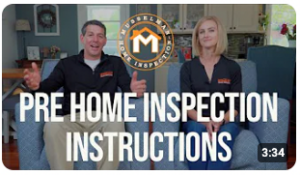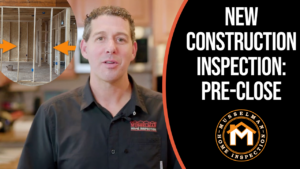Key Takeaways
- Understanding the significance of pre-purchase home inspections is crucial for making informed decisions when buying a property.
- A thorough home inspection covers essential aspects like structural integrity, plumbing, electrical systems, HVAC, and more.
- Choosing a reputable home inspector and knowing what to expect during the inspection process can help buyers navigate the home buying journey confidently.
Buying a home is a significant investment, and ensuring its structural integrity and safety is paramount. Musselman Home Inspection takes this process very seriously. This is one of the largest investments of your lifetime so it is critical that you understand exactly what you are getting into. A professional pre-purchase home inspection will help to unpack any potential issues. Musselman Home Inspection has the experience and expertise to give you the information needed to make an informed decision about one of the largest investments you may ever make… your home!. In this guide, we’ll delve into the importance of pre-purchase home inspections, what they entail, and how to choose a reliable home inspector. We have done Thousands of home inspections through the Philadelphia area and we have compiled some of the main ingredients in this guide to help you navigate what a pre-purchase home inspection is and will cover.
Why Pre Purchase Home Inspection Matters
A pre-purchase home inspection is a comprehensive evaluation of a home’s condition before finalizing the purchase. This inspection helps uncover potential challenges that may have been noticed during a casual walkthrough, providing buyers with a clear picture of the property’s overall health.
What Is a Pre Purchase Home Inspection?
During a pre-purchase home inspection, a qualified inspector thoroughly examines various aspects of the property. This includes assessing the structural components, plumbing systems, electrical wiring, HVAC systems, roofing, and more. The goal is to identify any existing problems or potential issues that could impact the property’s value or safety. In the Northeast, and specifically Pennsylvania, the changing climate can cause lots of issues with homes. Homes in this area can also date back hundreds of years so people must inspect these types of properties with companies that have experience with the age of the home and how that impacts the way the home was built.
The Process of Pre Purchase Home Inspection
The inspection process typically begins with a visual assessment of the exterior and interior of the property. Inspectors then focus on specific areas, such as:
- Structural Elements: Checking for signs of foundation issues, structural damage, or improper construction.
- Plumbing: Evaluating water supply, drainage systems, and identifying leaks or plumbing defects.
- Electrical Systems: Testing outlets, switches, circuit breakers, and ensuring electrical safety standards are met.
- HVAC Systems: Inspecting heating, ventilation, and air conditioning systems for functionality and efficiency.
- Roofing: Assessing the condition of the roof, including shingles, flashing, and any potential leaks.
Benefits of Pre Purchase Home Inspection
Undergoing a pre-purchase home inspection offers several benefits, including:
- Risk Mitigation: Identifying potential problems early can help buyers avoid costly repairs or unforeseen issues after purchase.
- Negotiation Power: Armed with inspection findings, buyers can negotiate repairs or price adjustments with sellers.
- Peace of Mind: Knowing the property’s condition provides peace of mind and confidence in the investment.
Common Issues Found in Pre Purchase Home Inspections
Some common issues discovered during home inspections include:
- Mold and Mildew: Often found in damp areas like basements or bathrooms.
- Pest Infestations: Such as termites, rodents, or insects that can cause damage.
- Water Damage: Leaks, water stains, or moisture issues that can lead to structural damage.
- Structural Issues: Cracks in walls, foundation problems, or improper construction.
How to Choose a Home Inspector
When selecting a home inspector, consider the following factors:
- Qualifications: Ensure the inspector is certified and experienced in residential inspections. Read about our expertise on our About Us page.
- Reputation: Look for reviews and recommendations from previous clients. Musselman Home Inspection has almost 300 reviews from local families that have used our services.
- Thoroughness: Choose an inspector known for detailed and comprehensive inspections.
- Communication: Opt for an inspector who can explain findings clearly and answer questions.
Educational YouTube Videos
Musselman Home Inspection values education. We want our clients to come armed with information not only about their potential home but also about what is involved in this process of doing a pre-purchase home inspection. There are many great resources online that we recommend, outside of our own website and YouTube Channel. Feel free to check out some of the videos highlighted below.
- Understanding Home Inspection Basics
- Tips for Homebuyers: What to Look for During Inspections
- Navigating Home Inspection Reports
FAQs About Pre Purchase Home Inspection
What is included in a pre-purchase home inspection?
A pre-purchase home inspection typically includes an assessment of the property’s structural integrity, plumbing, electrical systems, HVAC, roofing, and more.
How long does a pre-purchase home inspection take?
The duration of a home inspection can vary depending on the property’s size and complexity but typically lasts a few hours.
Can a home inspection uncover hidden problems?
A thorough home inspection can reveal concernshidden issues such as mold, pest infestations, water damage, or structural defects.
However, a home inspection is a non-invasive, visual assessment of a home’s key systems and structures. What does this mean? We are not permitted to damage any parts of the home in an effort to “see” things that might be hidden (i.e. cut through drywall, peal back flooring, etc). However, we can detect items like walls with high moisture which would provide an indicator that something may be wrong. And if we suspect there might be an issue such as mold due to the conditions we see (and possibly smell!), an Air Quality Test for Mold can provide another layer of confidence that can be purchased to identify things that cannot be seen. Another example of a “hidden” problem is Radon in a home. While we can’t see Radon… we can test the air to determine if and what level of Radon is in the home.
Planning Your Pre Purchase Home Inspection
Now that we have unpacked all the areas that come with a Musselman Home Inspection, now it’s time to schedule your inspection. For families living or looking in Berks County, Bucks County, Chester County, Delaware County, Lehigh County, Montgomery County, or areas within Northampton County…call or fill out a form to have Musselman Home Inspection visit your property to have your inspection completed!



